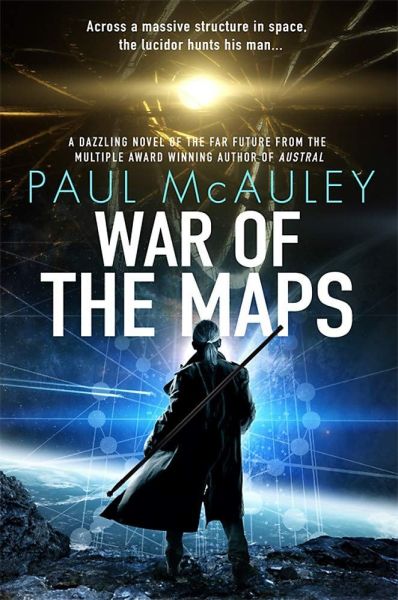Tempestuous Seasons
War of the Maps
By Paul McAuley

18 Mar, 2020
0 comments
Paul McAuley’s 2020 War of the Maps is a thus-far standalone science fiction novel.
Fearing the consequences should Remfrey He, the Free State’s greatest evil mastermind, be allowed to roam free unchecked, a retired lawman — the lucidor — sets out on an extremely unauthorized, one-man mission to track down his old enemy.
The world the lucidor must traverse is one vaster and stranger than our familiar Earth.
When the Andromeda and the Milky Way galaxies merged, the home star of humanity had long since guttered out into a white dwarf. Godlike entities surrounded the remnant with a huge artificial sphere, provided energy sources, filled a vast world ocean and seeded the continents — the maps — with life. For reasons now myth, the gods abandoned the world, leaving only enigmatic remnants of what might have been a great conflict.
One remnant of the gods is to be found in their abandoned children. Some have peculiar gifts: improved reflexes, electric touches, the ability to perceive genetic structure, and so on. Brilliant nihilist Remfrey He has a silver tongue, able to persuade virtually anyone of anything. The lucidor too has a gift, the ability to suppress other people’s gifts. Remfrey He’s knack does not work on the lucidor.
Remfrey He has ventured out of the staunchly egalitarian Free State into the land of its former masters, monarchal Patua. Patua faces both transformed invaders and incessant uprisings from its poverty-stricken people. This is a perfect situation for a master manipulator like Remley He.
Raised in the obsessively egalitarian Free State, Patua seems bizarre to the lucidor. Not only are the streets filled with beggars, nobody sees this as odd. At home the lucidor’s greatest obstacle is his inability to convince his superiors of the need to contain Remley He; in Patua, he meets an assortment of bandits and other predators eager to rob and kill the unwary. The lucidor may be unworldly but he is not unwary.
Remley He has found something even better to exploit than an embattled state. He has insinuated himself into a conflict between two opposed godlings. It’s a bold venture that could have devastating consequences for the world, but Remley He has never been a man who cared about the cost of his schemes for other people….
~oOo~
While I could find this book for sale via Amazon US, I think the vendors are selling imported volumes. Much American SF features megastructures akin to the one on which our very distant descendants adventure in this tale. Fewer of them have states like the Free State presented quite so sympathetically. The People’s House is obsessively democratic, and it does its best to ensure that everyone has enough, that everyone has some rewarding useful role. This would be suspiciously socialistic (gasp! horrors!) but we learn that the state also engages in top-down allocation of resources, a state of affairs that even the staunchest democratic socialists might find alarming. No need to ban books when the state controls whether or not they can be printed in the first place. Still, compared to Patua’s freedom to starve in the streets, the Free State’s interventionist habits don’t seem so bad. I am not surprised that this book has not found a US publisher (if that is indeed the case).
The first law of megastructures is “invest in sturdy boots, for you will be doing much walking.” War of the Maps is no exception: the lucidor does a lot of walking across vast expanses, as well as horse riding, train riding, and boat sailing. He’s just lucky his adventures do not require him to visit other maps, which are distant enough that contact is intermittent.
Entropy and its consequences are a continual drumbeat in the background of War of the Maps. Enough time has passed for the Sun and all massive stars like it to die. Despite galactic-merger-driven star formation, ancient red dwarfs dominate and soon enough all the young, large stars will die. The artifact on which the lucidor lives is itself doomed. Death and his personal desire to evade it (or at least make sure other people die first) drives Remley He.
This sounds like the basis for a very morose novel. After all, McAuley’s The Quiet War was gloomy enough for me to nope out early. This book, however, acknowledges that entropy must win and yet gives its central character causes that are important enough to die for — and does so in a way that makes the lucidor’s faith convincing. Just because the long run is gloomy is no reason to needlessly maximize misery in the short run. To quote the always effervescent John Milton Keynes’ A Tract on Monetary Reform
But this long run is a misleading guide to current affairs. In the long run we are all dead. Economists set themselves too easy, too useless a task, if in tempestuous seasons they can only tell us, that when the storm is long past, the ocean is flat again.
Much the same is true of science fiction authors. Hopeless doom and gloom are easy enough to write. McAuley has gone a different direction.
War of the Maps is available here (Amazon US), (Amazon Canada), (Amazon UK), and here (Book Depository), I could not find it on Chapters-Indigo.
